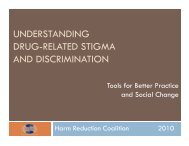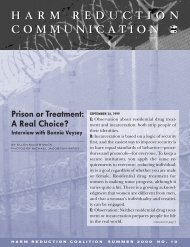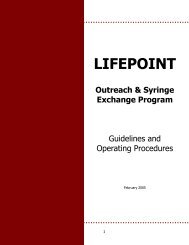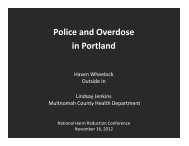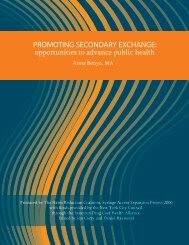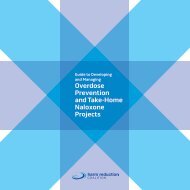9th - Harm Reduction Coalition
9th - Harm Reduction Coalition
9th - Harm Reduction Coalition
You also want an ePaper? Increase the reach of your titles
YUMPU automatically turns print PDFs into web optimized ePapers that Google loves.
<strong>9th</strong><br />
National <strong>Harm</strong> <strong>Reduction</strong> Conference<br />
FROM PUBLIC HEALTH TO SOCIAL JUSTICE<br />
is a tireless activist in the national and international movement of people who use drugs and is highly respected among her peers<br />
and other stakeholders. She recently received the International Rolleston Award in recognition for her work in harm reduction.<br />
Elizabeth Saracco has been meeting “traditional” social service providers “where they are at” and bringing a <strong>Harm</strong> <strong>Reduction</strong><br />
approach to services for Sex Workers and Drug Users since 2000. Elizabeth has developed and implemented numerous interventions<br />
including, “Choices” in collaboration with NJ DOH’ Division of Mental Health and Addiction Services and “Charm School” for<br />
HIPS, both of which, provide peer support, health education, goal setting and advocacy geared towards women who use drugs and<br />
trade sex. Elizabeth has held various positions at HIPS since 2003, most currently serving as Deputy Director. She has served as<br />
a consultant for NECAPT (Northeast Center for the Application of Prevention Technologies) and has presented various workshops<br />
and trainings on peer based strategies regarding public health and issues around the sex work and drug user communities at national<br />
and international conferences. Elizabeth possesses an AA in Liberal Studies from Harcum College, BA in Interdisciplinary<br />
Studies from Virginia Commonwealth University, and a MS in Clinical Psychology from California Coast University. While not doing<br />
HIPS stuff she likes collecting 80’s punk and metal records, watching Arsenal F.C. matches, drinking whiskey and experimenting<br />
with eye shadow.<br />
Childs, Robert, North Carolina <strong>Harm</strong> <strong>Reduction</strong> <strong>Coalition</strong>, Durham, NC<br />
robert.bb.childs@gmail.com<br />
Law Enforcement as <strong>Harm</strong> <strong>Reduction</strong> Advocates<br />
Injection drug users (IDUs) account for 16% of all new HIV infections and comprise 25% of the 1.1 million adults living with<br />
HIV in the U.S. Particularly hard hit is the South with more people living with HIV and dying of AIDS than in any region in<br />
the country. Similar to national trends, in North Carolina minority communities are disproportionately impacted further<br />
disenfranchised by higher rates of poverty, unemployment, geographic rurality and virtually non-existent state and local<br />
support for harm reduction services. Evidence has shown that syringe exchange programs (SEPs) are an effective public<br />
health prevention strategy that can reduce the spread of HIV/AIDS, by keeping communities clean and also by protecting law<br />
enforcement personnel at risk from needle stick injuries on the job. This presentation will highlight pre/post test pilot data<br />
from North Carolina <strong>Harm</strong> <strong>Reduction</strong> <strong>Coalition</strong>’s law enforcement trainings across the entire state regarding their attitudes<br />
on injection drug use, syringe decriminalization, and harm reduction. Findings offer practical first steps to further efforts<br />
to incorporate this kind of training to other Southern States, to highlight the benefit of harm reduction advocates and law<br />
enforcement, two unlikely partners, collaborating together in order to reduce the spread of HIV/AIDS and syringe related<br />
public health issues within North Carolina. The presenters will also discuss how to incorporate law enforcement into legislative<br />
advocacy and discuss examples of how to do this, using examples from North Carolina <strong>Harm</strong> <strong>Reduction</strong> <strong>Coalition</strong>’s law<br />
enforcement syringe decriminalization campaign that uses law enforcement as advocates.<br />
Robert Childs has served as NCHRC’s Executive Director since 2009 and was named one of five people who made a difference<br />
in HIV in the USA in 2011 by thebody.com. In addition to performing executive functions, he is involved in all program activities<br />
including service delivery, program design, innovation and evaluation, resource development and organizing. Prior to joining<br />
NCHRC, Robert served as a Public Health Operations Manager and Program Director at Positive Health Project in New York City,<br />
where he oversaw the syringe exchange, arts programming, law enforcement relations (between drug users, sex workers and<br />
law enforcement), harm reduction programs serving drug users and sex workers and led research on the public health effects<br />
of people injecting in the public domain. Robert has worked in harm reduction for over 10 years and is considered an expert on<br />
syringe access, harm reduction, law enforcement and drug user interactions, sex work and overdose prevention and has spoken<br />
on such at the United Nations, the FDA, New York City Council and the North Carolina, New Hampshire and Oregon Legislatures.<br />
18



